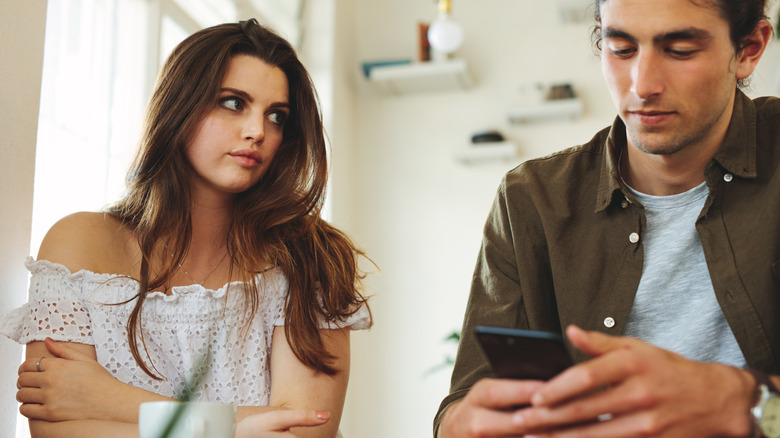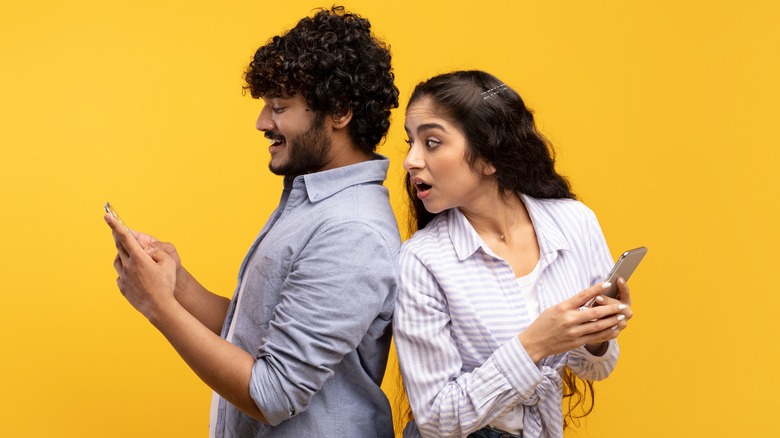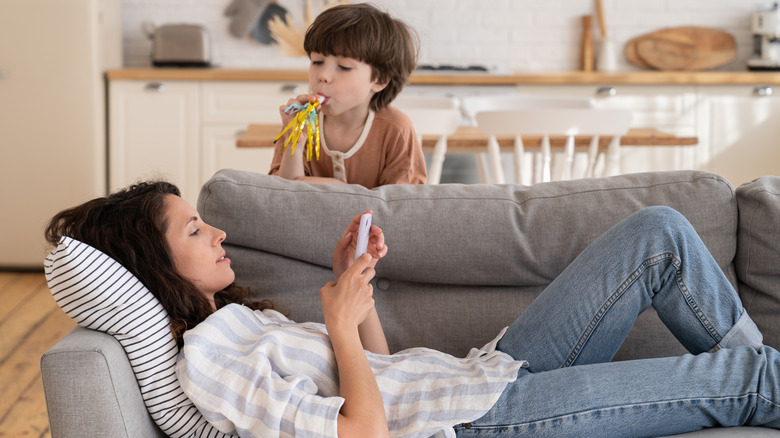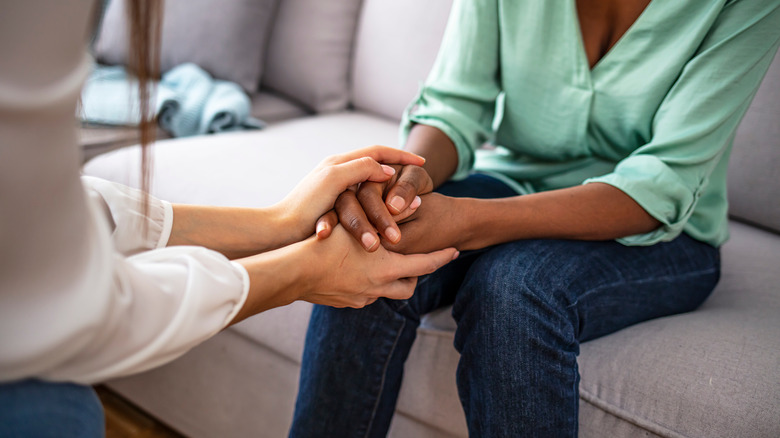How The 'Phubbing' Phenomenon Is Hurting Relationships
You've heard of the fast lane and the breakdown lane, but what about the cellphone lane? In 2014, Chongqing, China, instated a 100-foot pedestrian path exclusively for texters (via The Guardian). Antwerp, Belgium, did the same in 2015. "You probably walk through the streets while texting or sending WhatsApp messages to your friends and don't pay attention to your surroundings — only to whatever is happening on your screen," an Antwerp-based Mlab spokesman told Yahoo News at the time, warning that looking down at your phone can have painful consequences.
For the past decade-plus, cellphone-related injuries have been on the rise, jumping by a staggering 700% between 2002 and 2015 (via the National Library of Medicine). As early as 2008, several London lampposts were equipped with protective pads. The stunt, staged by the media company ITN, was meant as a commentary on distracted pedestrians, per Wired. But not all cellphone injuries are lamppost or even car-related. In the words of pain management specialist Dr. Robert Bolash, "looking down and dropping your head forward changes the natural curvature of your neck." As he explains to the Cleveland Clinic, "over time, that misalignment can strain muscles and cause wear and tear on the structures of the neck."
Beyond the physical ill effects, frequent cell phone use has been associated with damaged relationships, romantic and otherwise. Specifically, "phubbing" is a modern take on snubbing — it refers to neglecting your friends, partner, or family in favor of your phone.
Phubbing can lead to jealousy between partners
Words are often born out of necessity, and "phubbing" is no exception. In May 2012, five years after the first iPhone debuted on Apple's shelves, a team of language experts introduced phubbing to the dictionary, per Merriam-Webster. They defined it as "the act of snubbing someone in a social setting by looking at your phone instead of paying attention."
Regarding romantic relationships, phubbing can lead to feelings of jealousy and inadequacy. As noted by Yeslam Al-Saggaf, associate professor at Charles Sturt University, we may wonder if our partner is building a connection with someone else online (via The Conversation). "Ironically," says Emma Seppälä, a psychologist at Stanford and Yale universities, "phubbing is meant to connect you, presumably, with someone through social media or texting." However, as she explains to Time, "it actually can severely disrupt your present-moment, in-person relationships." If the behavior continues, phubbing can worsen signs of depression and anxiety and lead to a general collapse of intimacy in the relationship. In an effort to retaliate, the snubbed (or, in this case, "phubbed") partner may turn to their phone — a vicious cycle.
In some cases, phubbing can be a symptom of a larger issue within the relationship. According to a 2022 research article published by Frontiers, certain behaviors — in this case, looking at your phone — can be classified as avoidant.
Phubbing isn't only applicable to romantic relationships
In the age of social media, phone addiction affects nearly 50% of Americans (via Exploding Topics). Children who feel like they're competing with their parents' smartphones for affection may grow up to develop similarly problematic relationships with the internet. Associate professor Yeslam Al-Saggaf also cites evidence of higher levels of depression and anxiety within these households, per The Conversation.
"Parents rely on the convenience of smartphones (i.e., alarms, book reading, scheduling, news, social connections, etc.), thus creating a sense of dependence," Felice Martin, a private practitioner at Behavioral Health Associates of Georgia, LLC, tells Verywell Mind. Over time, "phubbing can make a child feel inadequate, lonely, rejected, and dismissed. Researchers have found that children become anxious or depressed when ignored. He or she may think they are insignificant."
Ultimately, active listening is a key ingredient in building healthy relationships. In the words of Felice Martin, "I encourage parents to put their phones down when communicating with their children. Eye contact matters and lets the child know they are valued."
How to break your phubbing habit
Fortunately, you're not doomed to phub — or be phubbed — forever. Verywell Mind suggests using the "do not disturb" setting on your phone or switching it to silent mode. Alternatively, establish rules like "no screens at the dinner table" or schedule goals and games for yourself — a tech-free walk, a riddle to solve without the help of Google, or maybe even a board game night with friends.
If you have family members or a partner guilty of phubbing, associate professor Yeslam Al-Saggaf recommends speaking with them honestly about how their behavior makes you feel (via The Conversation). Breaking a habit is difficult but not impossible. As Dr. Emma Seppälä, author of "The Happiness Track," advises Time, "be patient and compassionate and don't take offense, because they're following an impulse." Ultimately, "their goal is probably not to exclude you. They're looking for inclusion; that's probably why they're looking on their phone."



